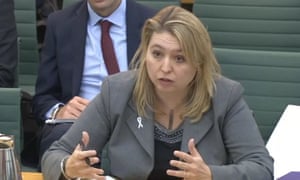
The culture secretary has dramatically reopened the issue of press regulation by questioning whether the second part of the Leveson inquiry, meant to investigate corrupt dealings between the press and police, was still in the public interest.
Karen Bradley confirmed a Guardian report that the government is to launch a consultation on two remaining issues: costs provisions for victims of phone hacking and Leveson “part two” into police wrongdoing. The latter had been delayed by continuing criminal actions resulting from the phone-hacking scandal at News International, which prompted the Leveson inquiry in 2011.
Speaking in parliament, Bradley said the extent of those criminal investigations, and the implementation of recommendations in part one of the report, as well as the costs for both of nearly £50m, meant the government was reconsidering whether to undertake part two.
In a statement, the government said that the consultation would consider whether part two was “still appropriate, proportionate and in the public interest, and if so what it should cover and in what form”.
Accused by campaigners for press victims and some Labour MPs of pandering to newspaper press barons and ignoring their victims, Bradley said further consultation was the only way to ensure a balance was struck between the two sides.
“Those who are treated improperly must have redress,” she said. “Likewise, politicians must not seek to muffle the press or prevent it doing legitimate work, such as holding us to account. And the police must take seriously its role in protecting not only its own reputation, but also those people it is meant to serve.
“This is the balance that we wish to strike, and this consultation is the most appropriate and fairest way of doing so.”
In response, Tom Watson, the shadow culture secretary and deputy Labour leader, said it was a “sad day”, coming almost three years after cross-party agreement was reached on the Leveson recommendations.
“In effect, she is today announcing whether a cover-up should be covered up. Events in the last five years make Leveson part two __more urgent, not less.”
Evan Harris, joint executive director of Hacked Off, which represents victims of press intrusion, accused the government of “caving in to Rupert Murdoch and his fellow proprietors” by launching an “unnecessary consultation”.
The postponement and potential cancellation of part two of the inquiry was “an outrageous betrayal of promises made to victims of press abuse and to the British people by the former prime ministers”, he said.
“This consultation will not change the fact that the government gives every impression of being in hock to powerful press interests and ignoring not just the victims of press abuse, but the fact that promises were made under oath at a public inquiry and to parliament.”
Bradley was asked in the House whether Theresa May had discussed the process at her private meeting with Murdoch last month. Watson also asked if Lord Justice Leveson had been consulted about the latest inquiry, and whether Bradley had talked to the victims of phone hacking, such as the parents of Milly Dowler.
Bradley said the first people she had met since starting as culture secretary this summer had been such victims.
The second remaining issue to be subject to the inquiry, often referred to as “costs provisions”, involves the implementation of section 40 of the Crime and Courts Act 2013, which though enacted by parliament, needs to be commenced by the culture secretary.
These provisions, bitterly opposed by the newspaper industry, would make members of a recognised self-regulator exempt from paying their opponents’ legal costs.
Impress is the only regulator to receive such recognition but it has just 50 small media groups as members, while Ipso, the press regulator with __more than 2,500 members backed by most big newspaper groups with the exception of the Guardian and the Financial Times, will not seek recognition, citing fears over political interference.
If section 40 is commenced there is a presumption that newspapers outside a recognised self-regulator would pay their own and their opponents’ legal costs, even if they won a court case.
Bob Satchwell, executive director of the Society of Editors, welcomed the consultation exercise. “Over the past decade the economic and competitive background has also changed dramatically. It would be dangerous to open up local and regional papers particularly with threats of legal action to costs of which they would have to pay even if they won a case, and which could put them out of business.
“A detailed look by government at the realities of regulation is the best way to ensure that individuals are properly protected without losing valuable watchdogs that expose corruption, wrongdoing and hypocrisy in the public interest.”
There have been persistent rumours that the government had decided to shelve the second part of Leveson, fuelled in recent weeks by reports in the Times and the Daily Mail. Downing Street has repeatedly denied that any decision had yet been taken about whether to continue with the inquiry.
Following the Bradley statement, a Lords amendment to the investigatory powers bill, which would have introduced section 40 for the victims of phone hacking was blocked by the government. The Commons rejected the Lords amendment by 298 to 261, a majority of 37, following a debate. It is thought likely that the Lords will try again to get the powers onto the statute book, however.
The government’s consultation will last 10 weeks, closing on 10 January.